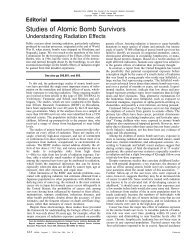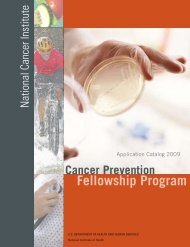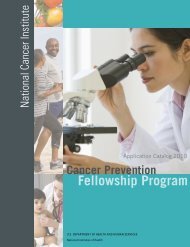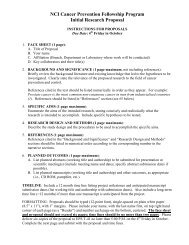Fellowship Program - National Cancer Institute
Fellowship Program - National Cancer Institute
Fellowship Program - National Cancer Institute
You also want an ePaper? Increase the reach of your titles
YUMPU automatically turns print PDFs into web optimized ePapers that Google loves.
Master of Public Health<br />
One of the unique features of the CPFP is the<br />
opportunity to receive formal, academic training<br />
in public health. By pursuing an M.P. H. degree,<br />
fellows learn about the current role of cancer<br />
prevention in public health and understand cancer<br />
prevention in the historical context of public<br />
health. The M.P. H. provides individuals with a<br />
strong foundation in the quantitative sciences<br />
of epidemiology and biostatistics. Fellows who<br />
already possess an M.P. H. degree, a Dr.P.H.<br />
degree, or a Ph.D. degree in biostatistics or<br />
epidemiology typically come directly to the NCI to<br />
begin their research.<br />
Once accepted into the CPFP, each fellow is<br />
responsible for arranging admission to a university<br />
offering an M.P. H. program that can be completed<br />
in 12 months or less. The NCI will pay the tuition,<br />
fees, book allowance, and fellow’s stipend<br />
during this year. It is expected that all M.P. H.<br />
requirements will be completed by the start of the<br />
NCI Summer Curriculum in <strong>Cancer</strong> Prevention.<br />
Fellows pursuing an M.P. H. degree are<br />
required to remain in the CPFP for a period twice<br />
the length of time of the M.P. H. training or to<br />
reimburse the Government the cost of the training<br />
and expenses. For example, attending a 12-month<br />
M.P. H. program requires a 24-month payback.<br />
It is the fellow’s responsibility to check with<br />
the university about admission, courses, and<br />
GRE requirements, as well as to ensure that the<br />
M.P. H. can be completed within the one-year<br />
time frame. Typically, universities require<br />
mathematics, biology, and chemistry courses at<br />
the undergraduate level; a current (usually within<br />
5 years) GRE score; and completion of the TOEFL<br />
(for foreign education) before acceptance into an<br />
M.P. H. program. The MCAT is the equivalent GRE<br />
requirement for physicians. To obtain information<br />
about the GRE, call (609) 771-7670; write to the<br />
Graduate Record Examination, P.O. Box 6000,<br />
Princeton, NJ 08541-6000; or visit the website<br />
http://www.gre.org.<br />
Listed below are examples of one-year<br />
accredited M.P. H. programs (as of February 2009)<br />
with their application due dates. <strong>Cancer</strong> Prevention<br />
Fellows have graduated from the universities<br />
marked **.<br />
For additional and updated information on M.P. H.<br />
programs, refer to the Association of Schools of<br />
Public Health website http://www.asph.org.<br />
•• Harvard University** (December 15)<br />
•• Johns Hopkins University** (December 1)<br />
•• Tulane University** (January 5)<br />
•• Uniformed Services University of the<br />
Health Sciences** (January 15)<br />
•• University of Kansas Medical<br />
Center (March 31)<br />
•• University of Minnesota** (Priority<br />
December 15; Final April 15)<br />
•• University of Southern Mississippi (April 15)<br />
•• Virginia Commonwealth<br />
••<br />
University (December 15)<br />
Yale School of Public Health (January 15)<br />
Mentored Research<br />
Under the shared guidance of an individual<br />
NCI preceptor and the CPFP scientific staff,<br />
fellows will develop original research projects in<br />
cancer prevention and control. An overview of the<br />
preceptorships is provided in this catalog (refer<br />
to Preceptorships section), and a more complete<br />
listing is provided on our and other NCI websites.<br />
http://cancer.gov/prevention/pob<br />
http://ccr.cancer.gov/<br />
http://cancercontrol.cancer.gov/index.html<br />
http://dceg.cancer.gov/<br />
Collaboration with investigators throughout the<br />
NCI is encouraged. Research opportunities include,<br />
but are not limited to:<br />
•• Biomarker development<br />
•• Chemoprevention studies<br />
•• Clinical cancer prevention research<br />
•• Effectiveness and outcomes research<br />
•• Epidemiology (clinical, environmental,<br />
genetic, molecular, nutritional)<br />
•• Ethics and evidence-based decision making<br />
(theoretical and practical studies)<br />
•• Health disparities and special populations<br />
•• Laboratory-based research<br />
(chemoprevention, molecular biology<br />
and genetics, nutritional science)<br />
•• Screening and early detection<br />
•• Social and behavioral research<br />
•• Statistical methodology (biometry<br />
and bioinformatics)<br />
<strong>Cancer</strong> Prevention <strong>Fellowship</strong> <strong>Program</strong> 5








